Chinanews.com, Hulunbuir, July 25th (Su Yiyu) China, Russia, and Mongolia border the 1,733.3-kilometer-long border in Hulunbuir, Inner Mongolia. There is such a sound of horses’ hooves, which is the “horn” of herdsmen’s border guards patrolling. Talking about the identity of herdsmen’s edge guard who has been passed down for three generations, Tumen said proudly, “I want to do one thing well in my life, which is edge protection.”
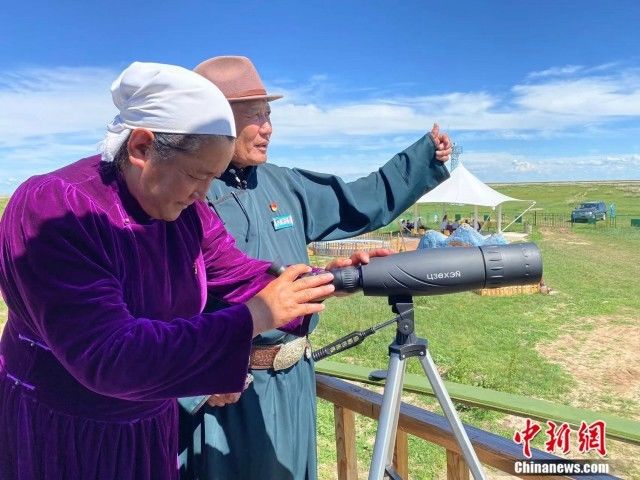
Tumen and his wife look out from the observation tower. Photo by Su Yiyu
Three generations of relay inheritance
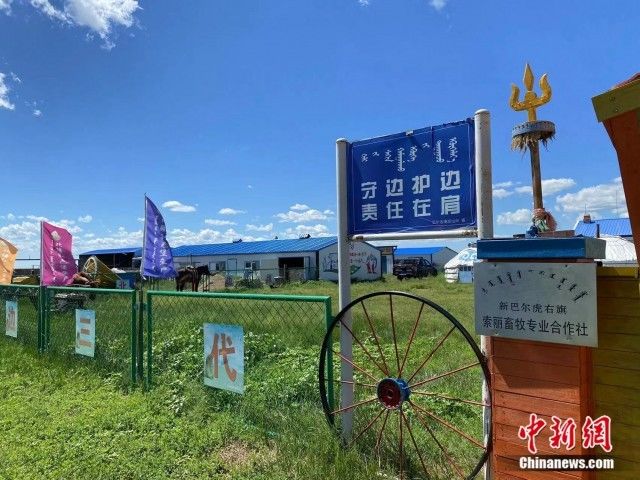
Tumen’s doorstep. Photo by Su Yiyu
Walking into Tumen’s house, three watchtowers with different architectural styles come into view. They are the workplaces where the three generations of Tumen’s ancestors and grandchildren patrol the border as herdsmen’s border guards, recording the stories of the three generations of border guarding.
Tumen’s house is less than 500 meters away from the China-Mongolia Jiehu Lake. Tumen’s grandfather, Barihasabada, was one of the earliest border guards at the Bell Border Police Station. After his grandfather died in the war, with his grandfather’s instructions before he left to “be sure to protect this grassland”, Tumen’s father took over the baton for the edge protection, and Tumen’s mother Siqin also joined the “Tie Girl Edge Protection”. team”.
“My father told me since I was a child that this is our home. We were born here, and we must shoulder the mission of guarding the border.” Influenced by his grandfather and father, with the heart of protecting the home and the country, Tumen also enlisted in the army to become a soldier.
After retiring, Tumen originally had the opportunity to stay in the city to work. However, his father’s rib injury and the inconvenience of seeing a doctor due to language problems made him change his mind. “I can’t do it without repaying my parents’ kindness to me (raising).” Tumen decided to return to his hometown and chose to be a “border soldier without military uniform” on the border line, becoming the third generation of “border guards” in his family. “.
The border guard’s work is hard and complicated. Neighbors once persuaded him: “It’s enough for us herdsmen to take care of their own sheep. What are you doing?” Whenever he heard such words, Tumen would always say: ” We were born here, and we are obliged to guard the frontier!”
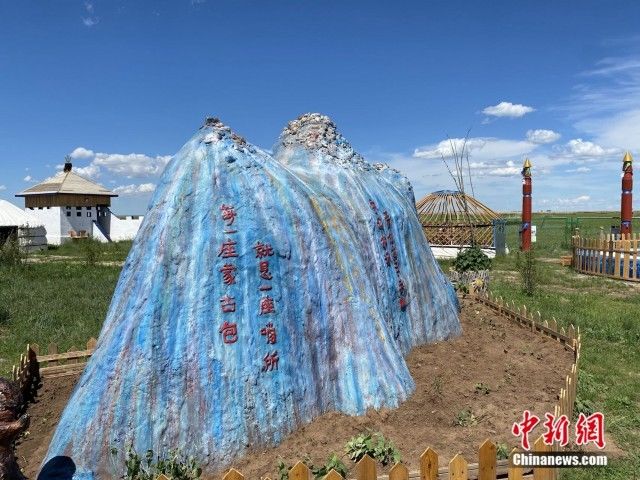
The rockery sculpture at Tumen’s house. Photo by Su Yiyu
“Every yurt is an outpost, and every herdsman is a sentinel.” This is a sentence on the rockery sculpture in Tumen’s house. Zhaoli Bayar, an organizational member of the Belsum Party Committee and the first secretary of Belgacha, told reporters that there are a total of ten herdsmen’s edge guards like Tumen in Belsumbelgacha, Xinbarhu Right Banner, Hulunbuir City, Inner Mongolia Autonomous Region. several households. “Most of these herdsmen’s border guards are born and raised in the local area. They are familiar with the surrounding environment. They fill in the blind spots and dead corners of military and police patrols and control, and jointly maintain border security.”
A side guarding the border line
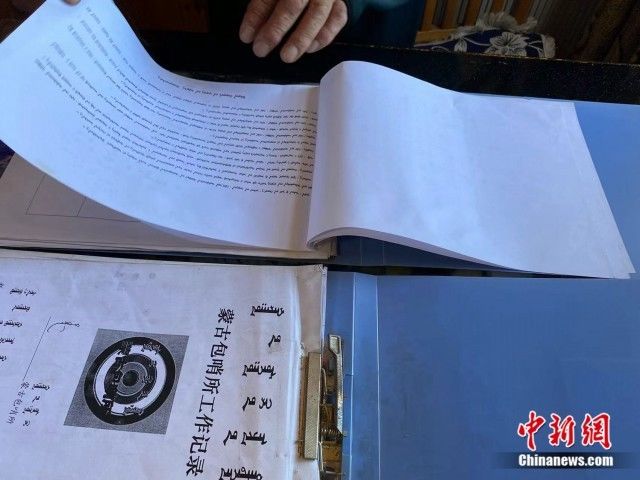
Tumen’s yurt outpost work log. Photo by Su Yiyu
This year marks Tumen’s 31st year as a herdsman’s border guard. Every day at dawn, Tumen climbed up the watchtower to observe the border line with binoculars, and inspected the movement of people and vehicles. Then, he stepped on the back of a horse, measured the border with “horse steps”, and started a day of patrol work. When he got home, Tumen would also record all the inspections in his work log.
For decades, Tumen has patrolled the edge in all weathers, exhausting 8 horses and riding 6 motorcycles. When it comes to border protection work, Tumen smiled lightly and said, “It’s cold in winter and hot in summer. People who don’t know it must seem to find it difficult, but they don’t feel tired when they actually do it.” Tumen’s silent adherence to the border line It has been recognized and praised by local herdsmen and the local police station. In Tumen’s house, large and small awards filled the cabinets and hung on the walls. When asked about his most proud and memorable honor, Tumen didn’t hesitate to hold up the “Top Ten Outstanding Edgeguards” medal.

Tumen presents the “Top Ten Outstanding Border Guards” medals to reporters. Photo by Su Yiyu
From stone roads to asphalt roads, from horseback patrols to bicycle edge guards, from human guarding to digital monitoring… According to Tumen, the party and the state have continuously provided policy subsidies and treatment to edge guards in recent years. It has been improved, and patrol equipment has also been distributed, and the edge protection work has gradually moved towards modernization.
In addition to guarding the safety of the frontier as a border guard, Tumen also guards the happy life of the local herdsmen. As a red fortress in northern Xinjiang, in his spare time, Tumen and his wife often lead herders to learn and publicize the policies of the party and the government, mobilize herdsmen’s enthusiasm, encourage them to develop their industries, and drive them to become rich as soon as possible. In recent years, Tumen has actively responded to the call of the Sumu Party Committee and the Gacha Party Branch, and helped 7 households including Wulijibatu and marginal households to raise sheep on their behalf, effectively driving them out of poverty and increasing their income.
His father’s experience in seeing a doctor made Tumen aware of the communication problems of the local herdsmen. After returning to his hometown, Tumen continued to learn Chinese by himself. Whenever anyone in the family got sick and needed to go to the city to seek medical treatment, he always enthusiastically helped the herdsmen. Being a “translator” solved the communication barriers. “I’m still learning (Chinese),” Tumen said while flipping through the study materials on his desk for reporters.
Inherit the “Three Generations Edge Protection” as “Generation Edge Protection”
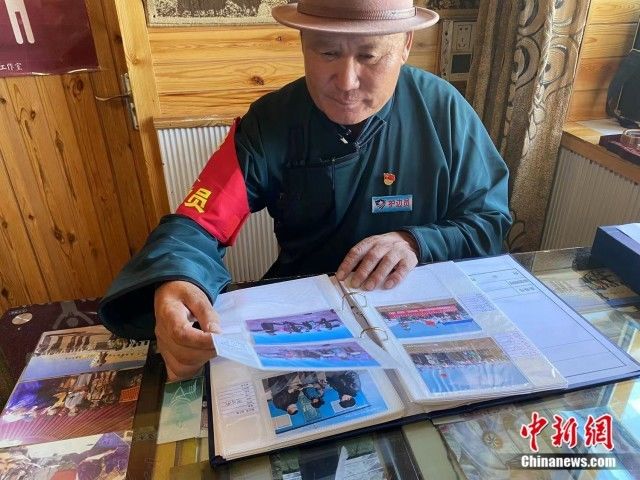
Tumen flips through the album. Photo by Su Yiyu
Flip through the photo album of Tumen, which is full of records of his daily life on the border and the activities of the Red Fortress. And seeing the old photos of his son when he was a child, Tumen’s face was full of smiles, “You look like this when you were a child, and now he is taller than me.”
Unlike when talking about the work of protecting the edge, when talking about his family, the expression of this Balhu grassland man showed a little debt, “there is always a lot of things that can’t be taken care of for the family.” When Tumen’s daughter was born and when his family was sick, he was often too busy with work to be there for them. However, it is precisely because of Tumen, herdsmen and border guards, that their small homes have added more strength and help to maintaining border security for everyone’s spirit.
“I will continue to walk down this road until the day when I am too old to move.” Tumen told reporters that his daughter was already preparing for the border guard job exam, and his son expressed his determination to guard border work. He wants to pass on the “three generations of border guards” as “generations of border guards”, and to pass on the “friendship of war” with the border police station from generation to generation.
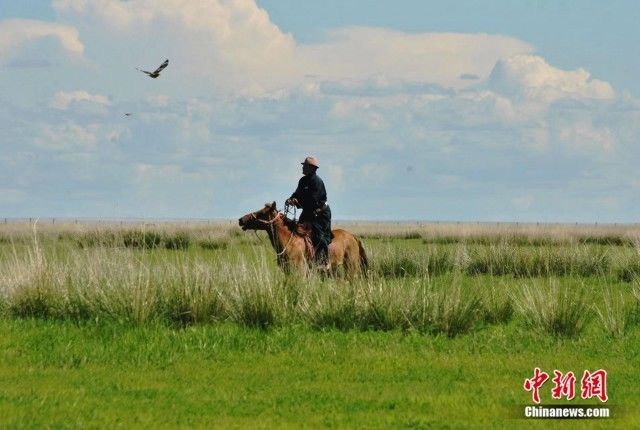
Tumen rides his horse on the grassland. Photo by Su Yiyu
Tumen’s deeds of border guards also infected many people, and many surrounding herdsmen took the initiative to apply to join the team of border guards. According to the reporter’s understanding, the Hulunbuir Border Management Detachment has carried out replacement, mixed formation and reorganization of the original group prevention and group management team, and standardized the formation of a team of 563 border guards, including coordinating the front exit points and border villages. Relations, focusing on the households along the front line and the main border roads, 66 “frontier protection fortress households” and 50 “frontier guarding center households” in the border villages and villages.
On the boundless green grassland, herdsmen like Tumen have become a beautiful “landscape” in the northern Xinjiang. They and the border police station help each other, and jointly build a solid foundation for the border security and stability of the motherland. protective wall.